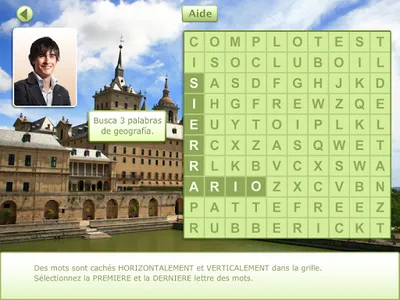This application, which is aimed at middle school students (4th / 3rd in LV1; high school revisions) offers activities for understanding the written language of the Spanish language. It can be used in the classroom, but also at home where it will be a valuable tool for learning and revising essentials.
It offers a "trip" to different cities in Spain: Palma de Mallorca, Seville, Santiago de Compostela, Barcelona, Salamanca and Madrid. Each stage corresponds to a type of activity and will be the opportunity to approach many cultural themes: daily life and living environment, cultural and historical heritage, landmarks and geographic realities, literary and artistic heritage.
Thanks to its dictionary and its correction modules which promote student autonomy, the learner trains at his own pace in the written comprehension of short texts.
The various interactive activities - hole and multiple choice exercises, reconstruction of dialogues, crosswords, error finding, etc. - particularly aim at enriching vocabulary and acquiring many grammar points. Students tackle syntactic notions such as different types of sentences, coordination, subordination, degrees of simple comparisons, gender and number, articles, adjectives, apocope, prepositions, pronouns, adverbs , the usual relative pronouns, the conjugation of regular verbs, the most common irregular verbs, the enclosure of the pronoun, auxiliaries, idiomatic constructions, etc.
It offers a "trip" to different cities in Spain: Palma de Mallorca, Seville, Santiago de Compostela, Barcelona, Salamanca and Madrid. Each stage corresponds to a type of activity and will be the opportunity to approach many cultural themes: daily life and living environment, cultural and historical heritage, landmarks and geographic realities, literary and artistic heritage.
Thanks to its dictionary and its correction modules which promote student autonomy, the learner trains at his own pace in the written comprehension of short texts.
The various interactive activities - hole and multiple choice exercises, reconstruction of dialogues, crosswords, error finding, etc. - particularly aim at enriching vocabulary and acquiring many grammar points. Students tackle syntactic notions such as different types of sentences, coordination, subordination, degrees of simple comparisons, gender and number, articles, adjectives, apocope, prepositions, pronouns, adverbs , the usual relative pronouns, the conjugation of regular verbs, the most common irregular verbs, the enclosure of the pronoun, auxiliaries, idiomatic constructions, etc.
Show More
















